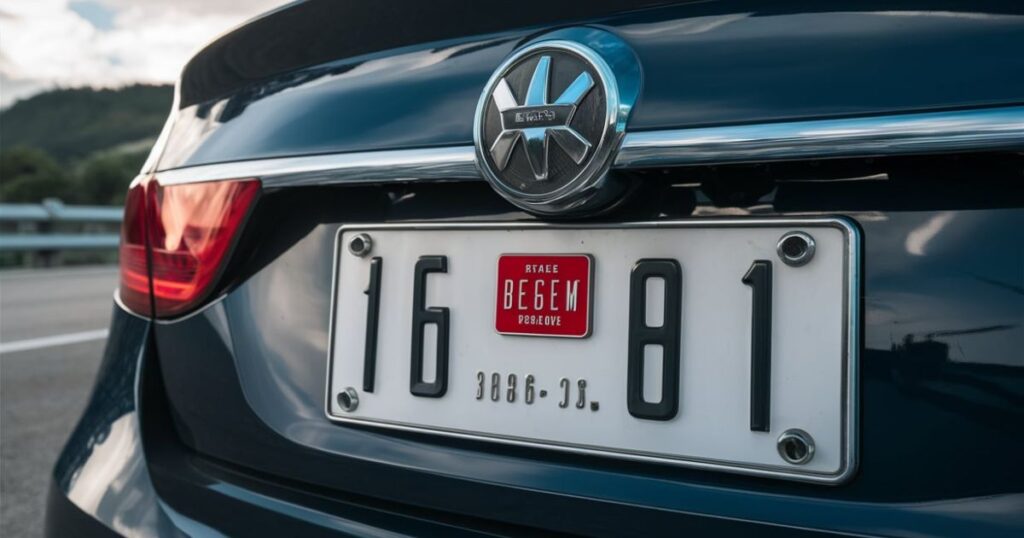License plate screw length refers to the size and specifications of screws used to stable a license plate onto a vehicle. It includes the duration and diameter of the screws, which are chosen based on factors just like the car’s mounting points and local policies.
It ensures your plate stays firmly in the vicinity without damaging your automobile. Whether you’re replacing antique screws or installing new ones, matching the scale on your car’s specs is fundamental. By using the correct registration code screw size, you can ensure peace of thoughts understanding your license plate is securely connected and compliant with regulations.
Choosing the proper license plate screw length is important for a secure shape. Different vehicles may also require distinctive screw sizes based on their mounting brackets. It’s vital to fit the screw period to the thickness of your car’s mounting factors.
Using the correct size helps prevent issues like loose plates or damage to the vehicle’s body.
Understanding License Plate Screw Sizes
Understanding registration code screw sizes is critical for making sure your license plate is securely and well affixed to your vehicle. The size of the screws you pick out plays an important function in stopping issues like plate damn or loss at the same time as driving.
Different cars may also require unique screw sizes to fit their mounting brackets and make certain a comfy attachment without being detrimental to the automobile’s body or paint. Factors including the cloth of the screws, environmental situations, and compliance with local regulations further affect your choice.
Importance of Choosing the Correct Screw Size
Choosing the precise screw length on your registration code is crucial for making sure a steady and stable attachment to your vehicle. The proper size prevents problems like free plates that may rattle or fall off while riding, which not only compromises the plate’s functionality but also poses safety risks.
Moreover, the use of screws that are too long can damage your vehicle’s frame or paint, even as screws that are too quick may not keep the plate securely. By selecting the appropriate screw size based on your vehicle’s specifications and mounting requirements, you can maintain the integrity of your license plate installation effectively.
Types of License Plate Screws
When it comes to affixing your registration code securely in your vehicle, the sort of screws you pick plays a vital role. Here’s a detailed look at the diverse styles of registration code screws available:
Standard License Plate Screws
Standard license plate screws are the maximum commonplace type used to safely attach license plates to cars. Usually made of durable metals like chrome steel, they function with flat or spherical heads for easy setup with trendy equipment. These screws are dependable, widely to be had, and appropriate for most automobiles’ mounting brackets.
- Description: These are the most not unusual kind of license plate screws, commonly fabricated from metallic (frequently stainless steel), and include both a flat or spherical head.
- Application: Standard screws are utilized in most cars and are well matched with the majority of license plate brackets and mounting factors.
- Advantages: They are straightforward to install and replace, broadly to be had, and commonly cost-effective.
Self-Tapping Screws
Self-tapping screws are designed to create their private threads as they may be driven into materials like metal or plastic. This gets rid of the want for pre-drilled holes, making them convenient for brief installations or maintenance. They’re particularly useful for restoring stripped threads or securely fastening items without the hazard of splitting softer substances.
- Description: Self-tapping screws are designed to create their threads as they’re driven into the material.
- Application: They are useful whilst changing stripped threads or while putting in into metal surfaces that do not have pre-drilled holes.
- Advantages: Self-tapping screws reduce the need for tapping gear or pre-drilled holes, making them convenient for brief upkeep or installations.
Security Screws
Manufacturers design security screws with unique heads that require specialized gear, such as Torx or safety Torx drivers, for installation and removal. People generally use them to prevent unauthorized elimination of license plates, supplying greater security against robbery.
- Description: Security screws are designed with specific heads that require specialized gear for removal, consisting of Torx or safety Torx heads.
- Application: They are used to deter theft of license plates, as they can’t be effortlessly eliminated with general tools.
- Advantages: Provide an added layer of security in opposition to registration code robbery, which may be a not unusual difficulty in some regions.
Anti-Theft Screws
Anti-theft screws are designed with particular heads like Torx or security Torx, making them tough to take away without specialized equipment. They offer introduced safety towards registration code robbery through deterring unauthorized elimination. Ideal for areas liable to theft, they offer peace of thought to automobile owners concerned about safeguarding their license plates.
- Description: Similar to security screws, anti-robbery screws have specific designs or functions that lead them to be tough to get rid of without the perfect device.
- Application: They are used to prevent unauthorized removal of license plates, supplying peace of thought to vehicle owners.
- Advantages: Enhance protection by way of requiring specialized tools, thus reducing the chance of registration code theft.
Snap-On Caps
- Snap-On Caps are an accessory for registration code screws that offer a neat and polished look once installed. These caps snap securely over the screw heads, supplying safety against weather elements and adding a hint of aesthetic enchantment to your vehicle’s registration code assembly.
- Description: These screws come with snap-on caps that cover the screw head as soon as mounted, presenting a clean and finished appearance.
- Application: They are regularly used for aesthetic purposes or in regions with harsh climate situations to defend the screw heads from corrosion.
- Advantages: Improve the arrival of the license plate installation whilst providing safety towards elements that would motivate deterioration.
Each sort of license plate screw serves unique purposes primarily based on elements along with protection needs, installation necessities, and aesthetic choices. When deciding on the right screws to your Florida custom license plate, do not forget those factors to make certain a steady and durable setup that complies with each useful and criminal standard.
Standard License Plate Screw Sizes

Standard registration code screw sizes usually confer with screws which are #14 in diameter and three/four inch in period. The maximum normal kind of screws for mounting license plates onto motors is these. Manufacturers generally make them of metallic, such as stainless steel, and include both flat or spherical heads.
Standard screws are versatile and match maximum vehicle license plate brackets and mounting factors. Their sincere design and tremendous availability cause them to be a popular preference amongst automobile proprietors for securely attaching license plates while ensuring compliance with prison requirements concerning visibility and mounting specifications.
Metric License Plate Screw Sizes
Metric license plate screw sizes, such as M6 x 20 mm, are commonly used on European vehicles and some newer models worldwide. Unlike popular inch-based totally screws, those metric sizes adhere to international standards and suit seamlessly into corresponding threaded holes.
The M6 designation refers back to the diameter of the screw thread (6 mm), even as the 20 mm suggests the duration of the screw. Choosing the suitable metric size ensures a secure and right fit for your license plate, aligning with the appropriate specs required by your automobile’s mounting brackets and making sure of compliance with international standards for automotive hardware.
Custom Screw Sizes for Specialty Vehicles
Custom screw sizes for specialty vehicles cater to unique mounting requirements dictated by vehicle design or aftermarket modifications. These screws deviate from standard sizes to accommodate specific vehicle models, which may have unconventional license plate brackets or mounting points.
Whether it’s adapting to thicker materials, non-widespread hole placements, or enhancing the overall aesthetic with specialized finishes, custom screw sizes ensure a secure and tailor-made installation. Vehicle fanatics and proprietors of strong point motors depend upon those custom-designed options to hold each capability and the specific look in their cars whilst adhering to legal standards for license plate display.
Factors Influencing Screw Size Selection

Choosing the right screw size for your license plate involves considering factors like your vehicle’s model, the material of its mounting points, environmental conditions where you drive, and local laws. These elements ensure a secure fit that lasts, while also meeting legal requirements and adapting to your vehicle’s specific needs.
Vehicle Type and Model
The kind and model of your automobile play an important function in determining the precise screw size for your license plate setup. Different automobiles, which include vehicles, SUVs, sedans, and sports automobiles, have varying thicknesses of registration code brackets and mounting points.
It’s critical to pick out screws that fit the thickness and fabric of these mounting factors to make certain a steady and solid attachment. Choosing the ideal screw length tailored in your automobile type prevents troubles like loose plates or harm to the car’s body, ensuring your license plate remains firmly in location for the long haul.
Screw Material
Stainless steel screws are notably advocated due to their brilliant corrosion resistance, making them ideal for areas with varying weather situations. They resist moisture, salt, and different environmental factors that could cause rust, ensuring your license plate stays securely mounted through the years.
Zinc-plated metallic screws provide a fee-effective opportunity with appropriate corrosion resistance, appropriate for maximum climates. Nylon screws are gentle on surfaces and proof against corrosion, making them best for plastic or softer substances, though they may not be as durable in harsh conditions.
Legal Requirements
Vicinity influences the legal requirements for registration code screws, ensuring visibility, security, and compliance with local laws. These guidelines frequently specify the type, length, and location of screws used to mount license plates on vehicles. It’s crucial to adhere to those suggestions to avoid fines or consequences.
Some jurisdictions can also mandate that manufacturers use unique screw types to prevent tampering or theft, while others ensure that plates are securely affixed without obstructing visibility. Checking local rules ensures your car meets legal requirements, making sure each protection on the road and adherence to prison requirements.
Installation Method
The installation method for registration code screws varies depending on the cloth of your vehicle’s mounting points. For steel surfaces, self-tapping screws are handy as they devise their threads at some stage in setup, casting off the need for pre-drilled holes. This makes them ideal for short replacements or repairs.
Conversely, when mounting into plastic or softer materials, using screws that are gentle on these surfaces helps prevent damage. Proper installation ensures a secure fit and longevity of the license plate attachment, while also considering factors like ease of maintenance and adherence to local regulations for visibility and security.
Aesthetic Considerations
Aesthetic concerns play a vast role whilst deciding on screws to your registration code. Beyond capability, many vehicle proprietors prioritize the arrival in their automobile. Opting for screws with snap-on caps or decorative heads can enhance the overall look of the license plate installation.
These options not best offer a cleanser and extra finished look but also complement the car’s layout aesthetics. Whether it’s matching the screw heads to the vehicle’s coloration scheme or definitely who prefer a sleeker appearance, aesthetic picks make contributions to the vehicle’s visible attraction even as ensuring the registration code stays securely and legally installed.
Ease of Maintenance
Considering the ease of maintenance when selecting license plate screws is crucial for ongoing care of your vehicle. Opting for screws that are easy to remove and replace facilitates routine tasks such as cleaning or adjusting the license plate position. This consideration not simplest saves time but additionally reduces the chance of detrimental the screws or the car’s mounting factors at some point of upkeep activities.
Although anti-theft screws offer peace of mind by providing protection, they may require specialized tools for removal, so one should balance this with the practicality of everyday maintenance needs.
Personal Preferences and Requirements
Finally, personal preferences and specific vehicle requirements play a role in screw size selection. Some car proprietors might also decide on positive forms of screws based on previous experience, recommendations, or particular desires associated with their vehicle type or usage patterns.
By taking those factors into account, you could make a knowledgeable selection when choosing the right screw length on your license plate setup. Prioritize protection, compliance with guidelines, and durability to ensure a secure and long-lasting attachment of your registration code for your car.
Installing License Plate Screws: Best Practices

When putting in license plate screws, it is essential to comply with great practices for a secure and trouble-free attachment. Begin by making sure the mounting surface and holes are smooth and free of particles to save you from interference with the screws. Align the registration code well with the vehicle’s bracket to keep away from misalignment troubles that could lead to damn or incorrect becoming.
Use the ideal screw length and type suitable for your automobile’s mounting points and environmental conditions. Tighten the screws firmly with a screwdriver or drill, however, be cautious now not to over-tighten, which can harm the vehicle’s paint or mounting surface. Regularly test the screws for tightness to keep a stable installation over the years.
Common Issues with License Plate Screws
Weather elements, together with rain and snow, often cause common issues with registration code screws, including rusting, especially if low-grade or non-corrosion-resistant screws are used. Another difficulty is screws becoming free through the years, main to rattling noises whilst driving or even causing the registration code to fall off.
In some cases, screws may also strip the threading in the mounting holes, making it hard to secure the plate nicely. Addressing these issues usually involves regular inspection and upkeep, the use of extremely good chrome steel screws, and ensuring the right tightening at some point of installation to save you troubles and ensure the registration code remains securely connected.
Conclusion
In the end, expertise and deciding on the suitable registration code screw size is vital for making sure both the safety and durability of your automobile’s license plate set up. By thinking about factors that include vehicle kind, environmental conditions, and criminal requirements, you could make an informed choice that complements safety and compliance.
Whether choosing a well-known License Plate Srew Size, security alternatives, or forte sizes, prioritizing proper installation strategies and normal upkeep will help preserve a steady and solid attachment. Ultimately, selecting the right screw length no longer most effectively enhances the aesthetics of your car but also contributes to its ordinary protection and adherence to regulatory requirements.
FAQ
What size screws do I need for my license plate?
Typically, #14 x 3/4 inch screws are standard and fit most vehicles.
Are there different screw sizes for different vehicle types?
Yes, vehicle types may vary in their mounting brackets, requiring different screw lengths.
Do I need special screws for security?
Yes, security screws with unique heads are recommended to deter theft.
Can I use self-tapping screws for my license plate?
Yes, self-tapping screws are beneficial for creating threads in metallic surfaces without pre-drilled holes.
Are there regulations regarding license plate screw sizes?
Yes, local regulations may specify requirements for screw type, size, and placement to ensure visibility and compliance.









